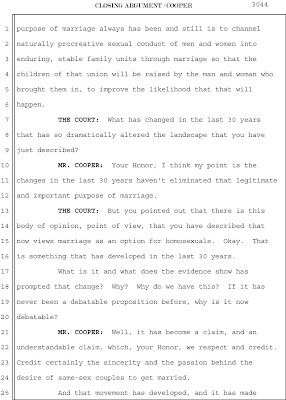Click to enlarge.
For the defense, attorney Charles J. Cooper argued that marriage has what he called a procreative purpose. "Purpose" is a tricky word to define, of course, but Cooper attempted what amounted to a common sense deduction from historical consensus. Marriage, said Cooper, has always been understood to be exclusively heterosexual.
Or, at any rate, always until recently.
That is, not always.
Having made that fatal error in logic, Cooper immediately tried to escape into rhetoric -- specifically, into personal appeal, metaphor, and the varied rhythmic repetition that classical rhetoric calls epimone. "Your Honor," he cried, "at the heart, at the very heart --"
But rhetoric was downed with no progress. Let's replay the collision.
Obviously, the answer to the judge's question is that homosexual conduct now is in the marriage conversation. But Cooper had another defense, one based on the linguistics of the social compact itself. Because of the movement for same-sex marriage, said Cooper, words about marriage have lost their power to signify.
That is, not always.
Having made that fatal error in logic, Cooper immediately tried to escape into rhetoric -- specifically, into personal appeal, metaphor, and the varied rhythmic repetition that classical rhetoric calls epimone. "Your Honor," he cried, "at the heart, at the very heart --"
But rhetoric was downed with no progress. Let's replay the collision.
Obviously, the answer to the judge's question is that homosexual conduct now is in the marriage conversation. But Cooper had another defense, one based on the linguistics of the social compact itself. Because of the movement for same-sex marriage, said Cooper, words about marriage have lost their power to signify.
For society itself, the result may be tragic. Mr. Cooper's own repeating words toll the dirge: "In the minds of many, yes, your Honor. In the minds of many." Mr. Cooper, at least, experiences distress.
But July 16 was Bloomsday -- the cheeriest day of the year for language. So for Bloomsday, 2010, diesen Kuss der ganzen Welt:





